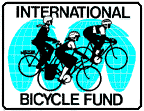Pan Africa Bicycle Information Network (PABIN)
THE JINJA DECLARATION - November 2001
The
first Pan African Bicycle Conference (PABIC) held in Jinja, Uganda, 21-25
November 2001, with international representation from 30 governments and
organizations, to “analyze the role of the bicycle in the 21stCentury”.
The participants of PABIC declare that the following
severely inhibit development on the African continent:
Mobility
and Transport
- Poor
access to; markets for smallholders and small entrepreneurs, health care,
schools, employment and leisure activity.
- Failure
by Governments to use all modes transport to improve essential service
delivery, such as; community health care, policing, education and
agricultural extension.
- Lack
of planning for mobility needs of the majority population.
Economy and Productivity
- High taxes and tariffs on bicycles, which have high price elasticity, leading to
low utilization.
- Mobility constraints limiting productivity, economic growth and employment
generation.
- Importing oil and motorized vehicles which are a major drain on foreign exchange.
- Urban traffic congestion, such as lost working hours, wasted fuel.
Quality of Life
- Road safety causing loss of life and property, especially to vulnerable road
users such as pedestrians, school children, bicyclists and the elderly.
- Traffic conditions which intimidate urban populations, eroding security and
livability.
- Environmental destruction; air, noise and water pollution, hydrology, emissions
of CO2 and other greenhouse gas pollution.
Planning, Policy and Politics
- Failure by the authorities to protect and enforce the rights of non-motorized
travelers.
- Inadequate training for road users and transport professionals.
- Transport plans and supportive policies which fail to address non-motorized transport
(NMT).
- Insufficient data which hampers effective planning and development of interventions.
- Underdeveloped infrastructure for NMT.
- Poor planning for multi-modal transport.
Given the importance of personal mobility for economic and social development, and
that affordable mobility is critical to sound economic and social development in
Africa;
Be it resolved that the governments of African States and other stakeholders
should:
- Recognize
that bicycles and other forms of non-motorized transport (NMT) are the most efficient
and effective modes of local transport.
- Formulation of an African NMT network and ongoing regional
coordination on NMT.
- Establish comprehensive plans for NMT as part of the National and Local
Transport Master Plans in order to exploit fully the potential
contribution of NMT to the sustainable development of African society and
national economy, generally, and the transport system in particular.
- These plans and programs should;
·
Address urban and rural transport issues.
·
Include rather than exclude; the poor, women, youth,
elderly and the disabled.
·
Facilitate multi-modal trip generation and assignment.
·
Establish planning and design guidelines and standards for NMT.
·
Promote development of policies and practices that protect the
rights of non-motorized travelers on an equal basis, including programs to
provide safety to them.
·
Establish a policy environment that supports activities that
utilize bicycles and other NMT in income and employment generating
activities.
·
Create awareness programs highlighting the importance of
NMT and its role in society.
·
Formulate policies and programs that will reduce environmental
destruction; air, water and noise pollution.
·
Eliminate taxes and tariffs on new bicycles and their spare
parts.
·
Develop regional teams for continued research, information
generation and dissemination.
·
Formulate policies that support the development of
bicycle enterprises in Africa.
Return
to PABIN Homepage
 Thank
you to our friends at the International Bicycle Fund
for providing and maintaining this web site.
Thank
you to our friends at the International Bicycle Fund
for providing and maintaining this web site.
"Hosted by
DreamHost - earth friendly web hosting"
Created by David Mozer.
Copyright © 1995-2025 International Bicycle Fund. All rights reserved.
 Thank
you to our friends at the International Bicycle Fund
for providing and maintaining this web site.
Thank
you to our friends at the International Bicycle Fund
for providing and maintaining this web site. Thank
you to our friends at the International Bicycle Fund
for providing and maintaining this web site.
Thank
you to our friends at the International Bicycle Fund
for providing and maintaining this web site.